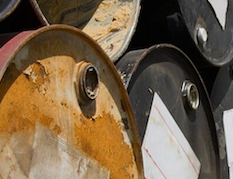US: Barrel Company Used Hidden Drain to Pollute County Sewer
SEATTLE (AP) — A century-old Seattle barrel company has been indicted along with its third-generation owner in what prosecutors describe as a long-running pollution conspiracy.

The 36-count indictment made public Wednesday said Seattle Barrel and Cooperage used a hidden drain to pump caustic wastewater directly into the King County sewer system.
Seattle Barrel refurbishes used industrial and commercial barrels and drums. Part of that process involves washing the barrels in a corrosive solution.
In a written statement provided by its attorney, Harold Malkin, Seattle Barrel blamed a former employee who was fired nine months ago. The company said it did not encourage or permit that worker's actions and that it will contest any criminal liability for it.
The former employee has not been charged in the case.
The indictment names Seattle barrel owner Louie Sanft, whose grandfather founded the company in 1916. It also names its plant manager, John Sanft, who is Louie Sanft's cousin. They are due to appear in court Jan. 9.
The charges they face include conspiracy, which carries up to five years in prison; lying to Environmental Protection Agency investigators, which carries up to five years; and violating the Clean Water Act, which carries up to three years per count.
“At a time when we are searching for strategies to protect Puget Sound and improve water quality for fish and wildlife, we need companies to do their share – not scheme for ways to pollute in private,” Seattle U. S. Attorney Brian T. Moran said in a news release.
Federal prosecutors said that dumping caustic, high-pH solutions into the sewer system can corrode it and the treatment plant and that the waste can wind up in Puget Sound, home to protected salmon, orcas and other species.
Since at least 2009, the company's discharge permit from King County has prohibited such discharges.
In 2012, an employee from the King County Industrial Waste Program reported seeing John Sanft dump oily waste. Over the next several months, the program conducted secret monitoring and discovered that Seattle Barrel was repeatedly dumping high-pH wastewater into the sewer.
The county fined the company $55,000, an amount that was reduced to about $17,000 when the company agreed to install an expensive wastewater treatment system. Louie Sanft claimed that the system made Seattle Barrel a “zero discharge” company.
That treatment system was not designed or used to handle waste from the 300-gallon (1,136-liter) tank used to wash the barrels, however. The tank was supposed to be cleaned by evaporating the water out of it, wiping out the remaining residue, sealing the residue in drums and then shipping it to another company for disposal.
Prosecutors said the company lied about doing that. Instead, the indictment said, Louie Sanft directed employees to pump the wastewater down an a hidden drain that led to the sewer.
An inspection in 2017 revealed irregularities in the company's handling of wastewater, and covert monitoring showed that the company continued to dump it down the sewer in 2018 and 2019, the indictment said. Meanwhile, Seattle Barrel filed reports with the county certifying that it had not dumped any wastewater.
The indictment charged that Louie Sanft had directed the conduct, advising employees to look out for regulators, and that John Sanft had sometimes helped.
Louie Sanft's attorney, Angelo Calfo, denied that.
“This case is about a former employee who cut corners for his own gain and in violation of company policy,” Calfo said. “Louie had no involvement and did not approve of what the employee was doing.”
Related News
From Archive

- Glenfarne Alaska LNG targets late-2026 construction start for 807-mile pipeline project
- U.S. water reuse boom to fuel $47 billion in infrastructure spending through 2035
- $2.3 billion approved to construct 236-mile Texas-to-Gulf gas pipeline
- Major water pipe break in Puerto Rico hits over 165,000 customers
- Potomac River Tunnel project enters construction phase beneath Washington, D.C.
- Pennsylvania American Water launches interactive map to identify, replace lead water service lines
- Trump's tariffs drive $33 million cost increase for Cincinnati sewer project
- Utah city launches historic $70 million tunnel project using box jacking under active rail line
- Tulsa residents warned after sewer lines damaged by boring work
- Fatal trench collapse halts sewer construction in Massachusetts; two workers hospitalized



Comments